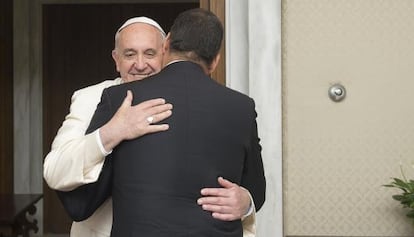Pope Francis to open Vatican archives on Argentinean dictatorship
The pontiff is working to find a way to make the records available


Pope Francis is keeping an eye on Argentina. He meets with important people from the country every week and is a significant player, behind the scenes, in national politics.
Now, the pontiff has decided to take on a bigger role in relation to the delicate issue of forced disappearances under the 1976-1983 dictatorship. Pope Francis’s closest collaborator and regular emissary to Argentina, Guillermo Karcher, has confirmed that the Catholic leader wants to open the Church’s archives on the Argentinean dictatorship and is working to find a way to make all the records available. The Church, a key player in the country during those years, received complaints from the mothers and other relatives of disappeared individuals and likely saved records of its dealings with the military regime.
The Argentinean Church may also carry out an examination of its role under the dictatorship
After meeting with Pope Francis last week, Ángela Boitano, president of the Group of Families of those Arrested and Disappeared for Political Motives, said the pontiff had assured her that he would make the records available. However, the Vatican initially declined to confirm or deny the claim.
Now, confirmation has finally arrived through Karcher. “The pope’s wish is this, that something be done, and in order for that to happen, he has given the task to the Secretariat of State and it has started working on the issue of declassifying Vatican records concerning the Argentinean dictatorship,” he told Radio America.
The organization also believes that the pope will go even further and collaborate so that the Argentinean Church will carry out an examination of its role under the dictatorship during which many in the clergy actively collaborated with the regime whose leaders professed themselves devout Catholics.
As soon as Francis was named pope, he received criticism from human rights groups over the attitude he showed toward two priests from his congregation who were kidnapped and then freed in 1976. Francis has always maintained that he did everything he could to help them. “The political will of the pope is clear. He will open the archives and he will promote self-criticism,” said Graciela Lois, a founding member of the relatives’ group calling on the pontiff to make the records available.
“A large segment of the Church, not exactly Bergoglio, was complicit in the dictatorship,” Lois continued. “Self-criticism is a necessity. We believe that it will be done. And we hope that opening up the archives will help us know the truth. Some things have already been opened, and if there is a petition from a judge, they are willing. But the most important thing is that now everything will be available. They have told us that they are working on it.”
Meanwhile, the pope is also campaigning for the beatification of several priests killed by the regime.
Karcher said that making the records available would take “serious work to organize everything in the Vatican archives in order to search and help many people.” He admitted that it would “take time” but said the “beautiful thing” was the pope’s “will to shed light on many situations that have been left without explanation.”
Tu suscripción se está usando en otro dispositivo
¿Quieres añadir otro usuario a tu suscripción?
Si continúas leyendo en este dispositivo, no se podrá leer en el otro.
FlechaTu suscripción se está usando en otro dispositivo y solo puedes acceder a EL PAÍS desde un dispositivo a la vez.
Si quieres compartir tu cuenta, cambia tu suscripción a la modalidad Premium, así podrás añadir otro usuario. Cada uno accederá con su propia cuenta de email, lo que os permitirá personalizar vuestra experiencia en EL PAÍS.
¿Tienes una suscripción de empresa? Accede aquí para contratar más cuentas.
En el caso de no saber quién está usando tu cuenta, te recomendamos cambiar tu contraseña aquí.
Si decides continuar compartiendo tu cuenta, este mensaje se mostrará en tu dispositivo y en el de la otra persona que está usando tu cuenta de forma indefinida, afectando a tu experiencia de lectura. Puedes consultar aquí los términos y condiciones de la suscripción digital.








































